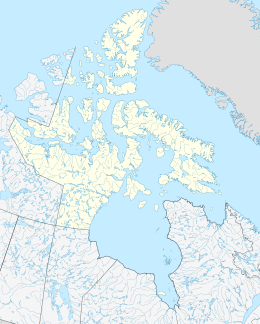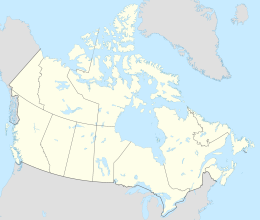Brevoort Island is a small, uninhabited island located in the Davis Strait off the eastern coast of Baffin Island in the Qikiqtaaluk Region of northern Canada's territory of Nunavut. The island is a member of the Arctic Archipelago and lies north of Cape Murchison, opposite the Cumberland Peninsula.
| Geography | |
|---|---|
| Location | Northern Canada |
| Coordinates | 63°30′15″N 64°20′00″W / 63.50417°N 64.33333°W[1] |
| Archipelago | Arctic Archipelago |
| Area | 271 km2 (105 sq mi) |
| Administration | |
Canada | |
| Territory | Nunavut |
| Region | Qikiqtaaluk |
| Demographics | |
| Population | Uninhabited |
Geography and climate
editBrevoort Island, with an area of 271 km2 (105 sq mi), is 46 km (29 mi) in length, and 5–7 km (3.1–4.3 mi) in width. It has a hilly interior, mostly composed of granite.[2]
Brevoort Island has a tundra climate (Köppen: ETf; Trewartha: Ftkc)
| Climate data for Brevoort Island WMO ID: 71097; Climate ID: 2400565; coordinates 63°20′23″N 64°08′45″W / 63.33972°N 64.14583°W; elevation: 376 m (1,234 ft); 1991–2020 normals, extremes 1959–present | |||||||||||||
|---|---|---|---|---|---|---|---|---|---|---|---|---|---|
| Month | Jan | Feb | Mar | Apr | May | Jun | Jul | Aug | Sep | Oct | Nov | Dec | Year |
| Record high humidex | −1.1 | 2.2 | −0.6 | 5.0 | 8.1 | 18.0 | 20.7 | 20.0 | 17.1 | 6.7 | 0.2 | −0.3 | 20.7 |
| Record high °C (°F) | 0.1 (32.2) |
2.2 (36.0) |
0.2 (32.4) |
6.1 (43.0) |
13.7 (56.7) |
17.2 (63.0) |
22.0 (71.6) |
21.6 (70.9) |
16.7 (62.1) |
7.8 (46.0) |
1.3 (34.3) |
0.0 (32.0) |
22.0 (71.6) |
| Mean daily maximum °C (°F) | −18.8 (−1.8) |
−20.0 (−4.0) |
−16.2 (2.8) |
−9.7 (14.5) |
−2.8 (27.0) |
3.1 (37.6) |
8.3 (46.9) |
7.8 (46.0) |
2.3 (36.1) |
−2.5 (27.5) |
−7.1 (19.2) |
−12.8 (9.0) |
−5.7 (21.7) |
| Daily mean °C (°F) | −21.2 (−6.2) |
−22.5 (−8.5) |
−19.0 (−2.2) |
−12.2 (10.0) |
−4.9 (23.2) |
1.0 (33.8) |
5.6 (42.1) |
5.4 (41.7) |
0.6 (33.1) |
−4.1 (24.6) |
−9.2 (15.4) |
−15.1 (4.8) |
−8.0 (17.6) |
| Mean daily minimum °C (°F) | −23.6 (−10.5) |
−25.0 (−13.0) |
−21.7 (−7.1) |
−14.8 (5.4) |
−6.9 (19.6) |
−1.2 (29.8) |
2.8 (37.0) |
2.8 (37.0) |
−1.1 (30.0) |
−5.8 (21.6) |
−11.2 (11.8) |
−17.4 (0.7) |
−10.3 (13.5) |
| Record low °C (°F) | −37.3 (−35.1) |
−40.6 (−41.1) |
−38.3 (−36.9) |
−31.7 (−25.1) |
−20.0 (−4.0) |
−11.1 (12.0) |
−6.1 (21.0) |
−6.1 (21.0) |
−10.1 (13.8) |
−20.6 (−5.1) |
−27.8 (−18.0) |
−34.8 (−30.6) |
−40.6 (−41.1) |
| Record low wind chill | −57.5 | −63.1 | −54.2 | −45.3 | −31.7 | −20.1 | −13.8 | −13.2 | −17.3 | −34.0 | −43.9 | −52.6 | −63.1 |
| Source: Environment and Climate Change Canada Canadian Climate Normals 1991–2020[3] | |||||||||||||
Military use
editThe island is the home of BAF-3, a North Warning System Long Range Radar site. Before the transition to the NWS it functioned as a rearward communications (relay) station for the Distant Early Warning Line, designated as RES-X-1 [4]
References
edit- ^ "Brevoort Island". Geographical Names Data Base. Natural Resources Canada.
- ^ "Brevoort Island". oceandots.com. Archived from the original on December 23, 2010. Retrieved 2008-04-13.
- ^ "Brevoort Island". Canadian Climate Normals 1991–2020. Environment and Climate Change Canada. Climate ID: 23026HN. Retrieved 2024-11-08.
- ^ "Brevoort Island, Nunavut". lswilson.ca. Retrieved 2008-04-13.
External links
edit

